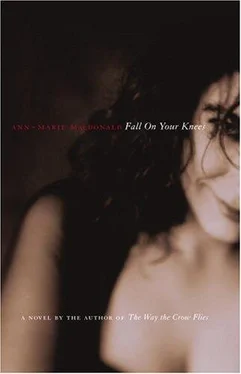“What’s that?”
“… Nothing.”
Fine. Let him eat with his hair in braids. Whom does it injure? Better than provoking a scene at table. As in the bad old days.
They say grace. James does not express surprise at the Lebanese feast spread out before him. He presses his portion of kibbeh flat with his fork, drizzles it with olive oil, tears off a bite-size piece of flat bread, wraps a bite of kibbeh in it and eats. Modestly, the way he always has, even when he worked in the pit, aware of how intimate an act eating is.
“You’ve outdone yourself, Frances,” he says. “It’s every bit as good as your mother’s.”
Mercedes knows she ought to be glad but this strange new peace between Daddy and Frances unnerves her.
“Thank you, Daddy,” Frances replies, pulling up her chair, “I learnt by watching.”
“Then you’ve got a photographic memory. That’s a sign of genius.”
Mercedes’ eyebrows approach the ceiling — let’s just say it’s been a day full of surprises. She picks up her fork and gingerly tastes the kibbeh . It is more than delicious. It’s as though Mumma were here. Mercedes closes her eyes for a moment in reminiscence of a precious time she knows could not have been: when Mumma was alive and we were all so happy. When was that time, where was that country? Rain begins to drizzle against the kitchen window, Frances lifts the lid from the steaming pot of bezzella and roz and Mercedes remembers: it was during the War. In the kitchen with Mumma and the Old Country. So happy. Mercedes opens her eyes again.
“What’s wrong, Mercedes?”
“Nothing at all, Lily.”
Mercedes permits herself to relax a little. She leans back in her chair and observes with satisfaction the flawless table manners of her family. She basks in their warm but civilized conversation. Everyone, it seems, has had an interesting day. Frances apportions second helpings. Lily reaches with her napkin and removes a spot of food from the left corner of James’s mouth, a small service for which neither thanks nor embarrassment is required. All quiet at the kitchen table.
Frances pours boiling water into the teapot and Mercedes is alarmed to notice James catch sight of himself in the kettle. Bristling with braids. The right side of his mouth breaks into a smile big enough to make up for the left side having lost the knack, and he laughs so hard that he falls dangerously silent between wheezy exhalations. Frances and Lily laugh too, until their throats ache and the tears stream, elbows thunking onto the table rattling the cutlery. Even Mercedes joins in and, once started, is unable to stop even after the others have recovered, then caught it again from her.
Exhausted, they fortify themselves with a pan of succulent Nellie’s Muffins straight from the oven. They sip tea. Listen to the rain. Outside, the whole world is hungry and forlorn. But in here is a little island of contentment.
At last, Mercedes thinks, we are a family. Daddy is senile, Frances is crazy, Lily is lame and I’m unmarried. But we are a family. Soon to be one more. And for the first time it crosses Mercedes’ mind to keep Frances’s child.
“Frances,” said James after the glorious Lebanese supper, “come here. I have something for you.”
Frances joined him in the front room. She sat on the piano bench and he handed her the white tissue-paper bundle.
“What’s this?” she asked.
“One or two things that belonged to your sister Kathleen.” Then he left the room.
Frances fishes a new candle from a kitchen drawer. She walks up the attic stairs, where the voices are louder than ever. She pauses, wishing they would speak one at a time and stop yelling. “I’m listening,” she says. But the hollow din rages on, so she continues up.
Now she and Trixie sit on the floor of the attic with the lighted candle. Frances looks down at the bundle in her lap. She parts the tissue folds. Lying on top of a soft pile is an old exercise notebook. The cover is imprinted with the Union Jack, the flag of Nova Scotia and the crest of Holy Angels Convent School. In a space marked “Name:” a grandiose signature spells “Kathleen Piper”. And in the space marked “Subject:” in equally florid strokes, “La vie en rose!”
Frances picks up the notebook. Turns to the last page first, and reads:
O Diary. My loyal friend. There is love, there is music, there is no limit, there is work, there is the precious sense that this is the hour of grace when all things gather and distil to create the rest of my life. I don’t believe in God, I believe in everything. And I am amazed at how blessed I am.
Then Frances turns back to the first page and begins:
8 pm, February 29, 1918, New York City
Dear Diary,
No, I will not use that form of address. That is a relic of childhood. This book will serve as a record of my progress as a singer. I will record only relevant facts which will prove useful as my training progresses. No gush….
Wax drips from the guttering candle-stub by the time Frances arrives once more at the last page. She closes the diary. “Goodnight, Kathleen.”
She turns her attention to what remains in the tissue-paper package.
Then she opens the hope chest.
The next day, James joins Frances on the veranda.
“Are you warm enough?”
“Yes thanks, Daddy.”
But he has brought an old tartan blanket and spreads it over her and Trixie anyway. “There.” He sits to the right of her on a kitchen chair next to her camp cot. He looks off at nothing in particular and starts talking, “I went down to New York because I got a letter.”
Frances doesn’t interject. She doesn’t look at him. She knows he will fly away if she does that, so she relaxes and listens to his story.
“It was the day of the Armistice. I got off at Grand Central Station and I walked all the way to where she was staying because I couldn’t get a cab. There were crowds. I didn’t know the war had ended….”
He trails off. They sit still and silent for a long comfortable time until he says to the middle distance, “Well it’s time I did a tap of work.” He picks up his cane and shuffles off to the shed. Trixie follows.
It takes six days. Mercedes leaves them each morning on the veranda and every afternoon she sees them when she returns up the street. It’s as though they hadn’t moved — although Lily assures her that they have been duly fed and watered. They look so peaceful sitting side by side, with their eyes settled on separate pieces of sky. Like old friends. Daddy and Frances.
Mercedes would like to sit and chat with an old friend, but she doesn’t have one. She had Helen Frye. And most of, all she had Frances. Where is Frances now?
Mercedes can see James’s lips moving as she approaches. What is he telling Frances? Day after day? He has always fallen silent by the time Mercedes is within earshot.
Walking home from school up Water Street on the chill seventeenth of November, Mercedes can see his breath. He is talking and talking, but by the time she reaches the veranda his words have given up their steamy ghosts. She greets them as usual on her way into the house, and finally hears something.
“How did the babies get in the creek, Daddy?”
Mercedes freezes on the threshold. Then walks briskly into the hall and, without removing her coat, runs up the stairs to her room. She leans against her door, slips a hand inside her blouse and feels for her opal rosary.
James reaches out his curled left hand without looking. He finds Frances’s head and bonks it, saying kindly by way of answer, “That’s all over and done with.”
Читать дальше












